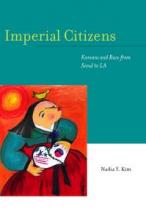 Students of South Korean multiculturalism have laudably given voice to the many non-Koreans who live in a proudly single-blood nation and have extensively criticized the state for its self-interested multicultural project. Without critiquing these claims, Kim argues that the multicultural scholarship has omitted one of the important groups who diversify South Korea and find themselves on the bottom of most racialized orders: the part-Black children of USA-ROK military couplings. This dearth of works on Korean-Black children in particular is unexpected in light of Superbowl XL MVP Hines Ward’s 2006 visit being widely seen as the opening salvo on a multicultural South Korea. Yet, because scholars are guided by the lens of the state on who the “multicultural citizens” are and because we typically opt for the conceptual language of ethnicity and ethnic nationalism over that of race and (ethno)racism, Black-descent populations tend to be overlooked. By doing so, Kim argues, we as scholars inadvertently reify the country’s belief that Blacks are the most biologically and culturally different from them and perpetuate the relative “closeness” and state “privileging” of diasporic Koreans, Asians from the Pacific region, and lighter-skinned people who themselves, to be sure, endure inequality. We also enable the state and like-minded adherents to promote policies of cultural assimilation of minorities that, in reality, deny pluralistic equality on the related basis of biological (racial) criteria. Kim will conclude with the consequences of inadvertently reifying state hegemonic projects.
Students of South Korean multiculturalism have laudably given voice to the many non-Koreans who live in a proudly single-blood nation and have extensively criticized the state for its self-interested multicultural project. Without critiquing these claims, Kim argues that the multicultural scholarship has omitted one of the important groups who diversify South Korea and find themselves on the bottom of most racialized orders: the part-Black children of USA-ROK military couplings. This dearth of works on Korean-Black children in particular is unexpected in light of Superbowl XL MVP Hines Ward’s 2006 visit being widely seen as the opening salvo on a multicultural South Korea. Yet, because scholars are guided by the lens of the state on who the “multicultural citizens” are and because we typically opt for the conceptual language of ethnicity and ethnic nationalism over that of race and (ethno)racism, Black-descent populations tend to be overlooked. By doing so, Kim argues, we as scholars inadvertently reify the country’s belief that Blacks are the most biologically and culturally different from them and perpetuate the relative “closeness” and state “privileging” of diasporic Koreans, Asians from the Pacific region, and lighter-skinned people who themselves, to be sure, endure inequality. We also enable the state and like-minded adherents to promote policies of cultural assimilation of minorities that, in reality, deny pluralistic equality on the related basis of biological (racial) criteria. Kim will conclude with the consequences of inadvertently reifying state hegemonic projects.
Associate Professor of Sociology at Loyola Marymount University, Kim researches ‘race’/ethnicity/nation, gender/relationality, citizenship, immigration/transnationalism, community politics, Asian American Studies, and Korean Studies. She authored the award-winning book Imperial Citizens: Koreans and Race from Seoul to L.A. and is penning another on marginalized immigrant women of color, citizenship, and Environmental Justice. For Kim's full bio and CV, click here.
This lecture is part of the seminar series "Race and Justice in Transnational Perspective," which is organized by Tanya Golash-Boza, Nigel Hatton, and David Torres-Rouff. The event is co-sponsored by the UC Center for New Racial Studies, Sociology, and SSHA.



